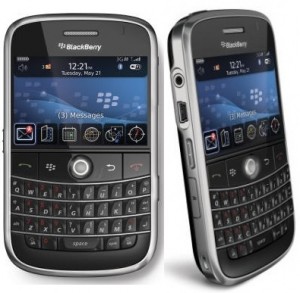5 Reasons Why a Med Student Should Have a Smart Phone
Categories: Fun

|
After being on the same old crappy Nokia cell phone for more than five years, I finally stopped being lazy and got myself a new phone this past June. But not just any phone, no – I went ahead and spoiled myself with a Blackberry Bold 9700.
Probably more than any purchase I have ever made, having a smart phone has really “changed my life”. I’m sure some people will think that’s a pretty exaggerated (or maybe even stupid) thing to say, but believe me when I say it’s not. Having a smart phone makes me feel constantly connected to my social network but also to the rest of the world. No matter where I am I have access to a ton of people and a ton of information. And all I need to do is whip this small device out of my pocket.
A smart phone is especially useful for people with busy lives, including med students. Are you a med student and still not convinced? In that case, I present to you, my top 5 reasons why med students should have a smart phone:
5. Passing time in lecture
Occasionally we will have a lecture where the professor is literally reading off the PowerPoint slides (I’m sure everyone will experience this at least once in undergrad). I have the notes, so there’s really no point in me being there because I can just read them at home at my own leisure. Thanks to my smart phone I can now pass time in class by surfing the web, texting friends sitting a few meters away, and so on.
Alright, alright, I’ll come clean – I do this even in lectures where I should be giving my full attention. It’s not my fault they make smart phones so much fun!
4. Checking exam marks
Our exam marks are sent by email at random times, usually in the middle of class. Before getting my Blackberry, I had to either borrow a friend’s phone or wait until the end of lecture and run to a computer. Given the number of exams I was scared of failing (yes medical school is hard!), you can imagine the amount of anxiety that takes over as you watch the clock for the next break. Now, I just take out my phone and find out that I aced the exam in a matter of seconds (and by aced I mean passed of course).
3. Looking smart in the hospital
I remember sitting at a lunch time meeting last year at Toronto General Hospital. The room was full of health care professionals, from general internists to emergency doctors to nurses. I was relaxing in my chair and texting a friend on my old Nokia phone. I looked around, only to see everyone else on their smart phones. How was I going to be taken seriously? Now, when I whip out my Blackberry randomly in the hospital, I fit right in. All I need now is to wear my stethoscope more frequently even when I don’t need it.
2. Impressing attending physicians
This summer I spent a lot of time shadowing in a psychiatry clinic where a large percentage of the population were children and adolescents. A common thing to do in regular appointments was to measure the child’s weight and height. The scale measured in kilograms. On more than one occasion a parent would ask: “What is that in pounds?” Thanks to my Blackberry, I did the conversion relatively quickly. There was also the time I used a Blackberry application to look up potential drug interactions for a medication a patient was considering taking. In both instances, the psychiatrist was impressed with the speed at which I was able to gather the necessary information, and the patient and family were grateful for my much needed contribution.
1. Contributing in PBL
Alright, so we’ve counted down to the number 1 reason why a med student should have a smart phone. If there’s anything I have learned from being in med school, it’s that you don’t want to look stupid. Why? Well everyone in your class is smart, so if you act stupid, there’s no way people will miss it! Any thoughts, words or actions of stupidity are most easily seen in a small group setting, such as PBL. If you’re a slacker, PBL is where you are most vulnerable to have your secret laziness revealed.
For those of you who don’t know, Problem Based Learning (PBL) refers to small group sessions where medical students go through a hypothetical clinical case, often about conditions they have not yet learned about. As the students go through the case together, they come up with learning objectives for things they don’t understand. Students then go home to research these areas and share what they have learned at the next session to make sense of the case.
As students go through the case, they use prior knowledge to try and figure the case out. But what if you’re one of those students who is constantly behind in material and know absolutely nothing? Well with a smart phone, you don’t actually need to have any knowledge to contribute to PBL. You can just start looking random things up, read off the screen, and BAM – you’re an instant contributor to the group!
Remember, perception is reality: you’re smart if people think you are.